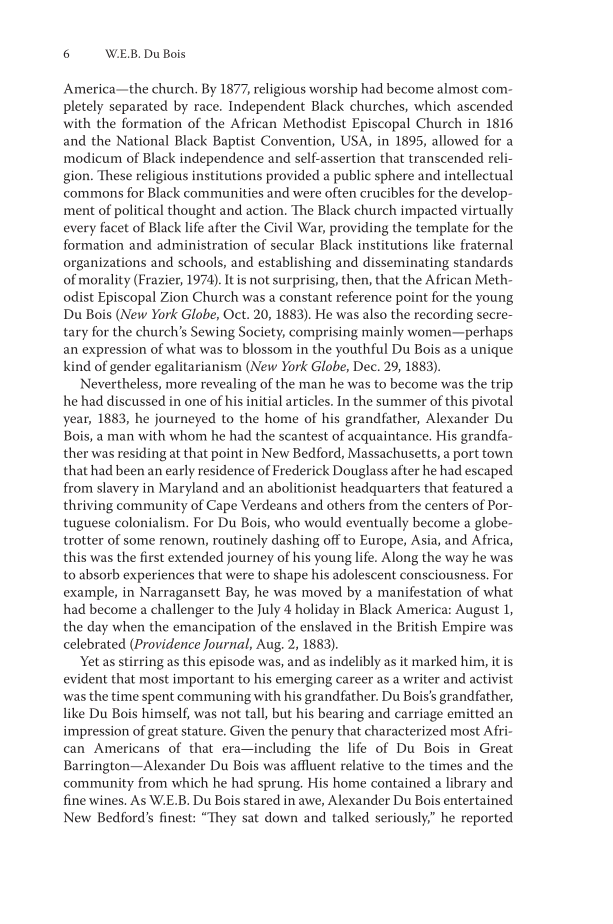6 W.E.B. Du Bois America—the church. By 1877, religious worship had become almost com- pletely separated by race. Independent Black churches, which ascended with the formation of the African Methodist Episcopal Church in 1816 and the National Black Baptist Convention, USA, in 1895, allowed for a modicum of Black independence and self-assertion that transcended reli- gion. These religious institutions provided a public sphere and intellectual commons for Black communities and were often crucibles for the develop- ment of political thought and action. The Black church impacted virtually every facet of Black life after the Civil War, providing the template for the formation and administration of secular Black institutions like fraternal organizations and schools, and establishing and disseminating standards of morality (Frazier, 1974). It is not surprising, then, that the African Meth- odist Episcopal Zion Church was a constant reference point for the young Du Bois (New York Globe, Oct. 20, 1883). He was also the recording secre- tary for the church’s Sewing Society, comprising mainly women—perhaps an expression of what was to blossom in the youthful Du Bois as a unique kind of gender egalitarianism (New York Globe, Dec. 29, 1883). Nevertheless, more revealing of the man he was to become was the trip he had discussed in one of his initial articles. In the summer of this pivotal year, 1883, he journeyed to the home of his grandfather, Alexander Du Bois, a man with whom he had the scantest of acquaintance. His grandfa- ther was residing at that point in New Bedford, Massachusetts, a port town that had been an early residence of Frederick Douglass after he had escaped from slavery in Maryland and an abolitionist headquarters that featured a thriving community of Cape Verdeans and others from the centers of Por- tuguese colonialism. For Du Bois, who would eventually become a globe- trotter of some renown, routinely dashing off to Europe, Asia, and Africa, this was the first extended journey of his young life. Along the way he was to absorb experiences that were to shape his adolescent consciousness. For example, in Narragansett Bay, he was moved by a manifestation of what had become a challenger to the July 4 holiday in Black America: August 1, the day when the emancipation of the enslaved in the British Empire was celebrated (Providence Journal, Aug. 2, 1883). Yet as stirring as this episode was, and as indelibly as it marked him, it is evident that most important to his emerging career as a writer and activist was the time spent communing with his grandfather. Du Bois’s grandfather, like Du Bois himself, was not tall, but his bearing and carriage emitted an impression of great stature. Given the penury that characterized most Afri- can Americans of that era—including the life of Du Bois in Great Barrington—Alexander Du Bois was affluent relative to the times and the community from which he had sprung. His home contained a library and fine wines. As W.E.B. Du Bois stared in awe, Alexander Du Bois entertained New Bedford’s finest: “They sat down and talked seriously,” he reported
Document Details My Account Print multiple pages
Print
You have printed 0 times in the last 24 hours.
Your print count will reset on at .
You may print 0 more time(s) before then.
You may print a maximum of 0 pages at a time.














































































































































































































































































